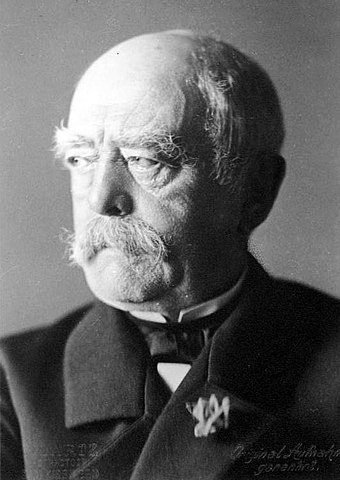More languages
More actions
Otto von Bismarck | |
|---|---|
 Bismarck in 1890 | |
| Born | 1 April 1815 Schönhausen, Saxony, Kingdom of Prussia |
| Died | 30 July 1898 (aged 83) Friedrichsruh, Schleswig-Holstein, Prussia, German Empire |
| Political orientation | Imperialism Reactionism Conservatism |
Otto Eduard Leopold von Bismarck-Schönhausen, often called the Iron Chancellor (German: Eiserne Kanzler), was a Prussian statesman and diplomat of the Junker class who in 1871 successfully led the formation of the German Empire, a united German state under Prussian dominance. From 1862 to 1890, he was the Minister President and Foreign Minister of Prussia, and after the formation of the German Empire he also served as its first Chancellor from 1871 until 1890, when he was dismissed by Wilhelm II.
Political career
In 1847 and 1848 Bismarck was selected as a representative to the newly created Prussian Landtag where he established himself as one of the most reactionary members, and a strong advocate of military force to suppress the 1848 revolution.[1]
From 1851 to 1859 he served as Prussia's representative to the Bundestag in Frankfurt, the council of the German Confederation. Following this, Bismarck served as envoy to Russia from 1859 to 1862 and envoy to France in 1862.[1]
Minister President
From 1862 Bismarck was made minister president and minister of foreign affairs of Prussia, and quickly set about strengthening his position and increasing military funding in order to fulfil his imperialist ambitions. In 1863 he agreed the Alvensleben Convention with Russia to jointly suppress any Polish uprisings in either states portion of occupied Poland. He then carried out the Second Schleswig War against Denmark in 1864, the Austro-Prussian War in 1866 against Austria and the Franco-Prussian War in 1870-71 against France as well as aiding the French bourgeoisie against the Paris Commune in 1871, all in the name of German unification under Prussian supremacy.[1]
Chancellor
Upon the formation of the North German Confederation in 1867 Bismarck became Bundeskanzler, before being made Reichskanzler upon the formation of the German Empire in 1871. As chancellor Bismarck consolidated the control of the Junker-bourgeois block; implementing protectionist policies that were advantageous to them whilst attempting to reduce the popularity of the socialist movement by implementing some minor social reforms. Bismark's government was particularly concerned about the threat of the Polish national liberation movement and attempted to "germanise" the Polish population whilst seeking closer relations with Austria-Hungary and Russia.[1]
Bismarck's foreign policy revolved around the suppression of the threat of France whilst keeping the full territorial integrity of his unified German state. To this end he concluded the Three Emperors' League with Austria and Russia in 1873 with the former continuing to fall increasingly under German influence with the alliance with Austria in 1879 and the formation of the Triple Alliance with them and Italy in 1882. Bismarck preferred expansion within Europe, particularly in the Balkans, but did also allow for Germany to build its own colonial empire in Africa and Oceania in the 1880s, which would bring it into conflict with the British.[1]
In 1884 and 1885, Bismarck hosted the Berlin Conference at his official residence, where the colonization of Africa was discussed by European imperialist leaders.[2]
In March 1890 Bismarck would be forced into retirement by German Emperor Wilhelm II following failures in suppressing the workers movement and foreign policy.[1]
References
- ↑ 1.0 1.1 1.2 1.3 1.4 1.5 M. N. Mashkin (1979). The Great Soviet Encyclopedia: 'Bismarck, Otto Eduard Leopold Von Schönhausen'.
- ↑ George Shepperson, "The Centennial of the West African Conference of Berlin, 1884-1885," Phylon (1960-) 46, no. 1 (1985): 37–48. https://doi.org/10.2307/274944.
